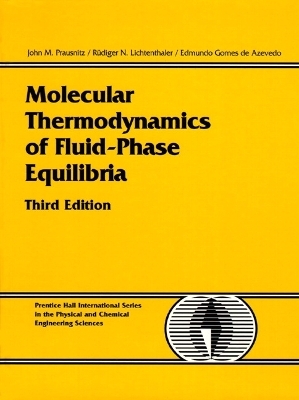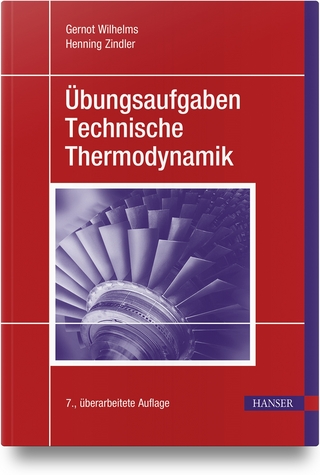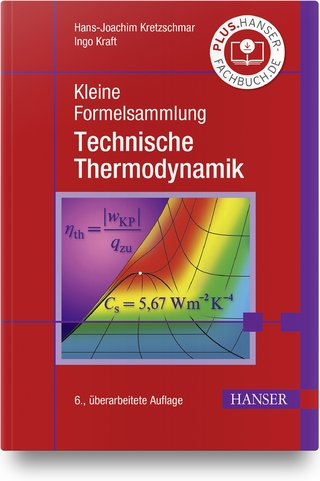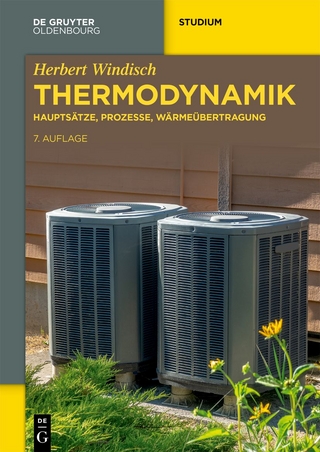
Molecular Thermodynamics of Fluid-Phase Equilibria
Pearson (Verlag)
978-0-13-977745-5 (ISBN)
The classic guide to mixtures, completely updated with new models, theories, examples, and data.
Efficient separation operations and many other chemical processes depend upon a thorough understanding of the properties of gaseous and liquid mixtures. Molecular Thermodynamics of Fluid-Phase Equilibria, Third Edition is a systematic, practical guide to interpreting, correlating, and predicting thermodynamic properties used in mixture-related phase-equilibrium calculations.
Completely updated, this edition reflects the growing maturity of techniques grounded in applied statistical thermodynamics and molecular simulation, while relying on classical thermodynamics, molecular physics, and physical chemistry wherever these fields offer superior solutions. Detailed new coverage includes:
Techniques for improving separation processes and making them more environmentally friendly.
Theoretical concepts enabling the description and interpretation of solution properties.
New models, notably the lattice-fluid and statistical associated-fluid theories.
Polymer solutions, including gas-polymer equilibria, polymer blends, membranes, and gels.
Electrolyte solutions, including semi-empirical models for solutions containing salts or volatile electrolytes.
Coverage also includes: fundamentals of classical thermodynamics of phase equilibria; thermodynamic properties from volumetric data; intermolecular forces; fugacities in gas and liquid mixtures; solubilities of gases and solids in liquids; high-pressure phase equilibria; virial coefficients for quantum gases; and much more.
Throughout, Molecular Thermodynamics of Fluid-Phase Equilibria strikes a perfect balance between empirical techniques and theory, and is replete with useful examples and experimental data. More than ever, it is the essential resource for engineers, chemists, and other professionals working with mixtures and related processes.
JOHN M. PRAUSNITZ is Professor of Chemical Engineering at the University of California, Berkeley. A leading consultant on petroleum, natural gas, petrochemicals, cryogenic, and polymeric processes, he has published over 550 research articles. He has twice been named a Guggenheim Fellow, and received the 1997 Arthur K. Doolittle Award from the American Chemical Society. RuDIGER N. LICHTENTHALER is Professor of Physical Chemistry and Applied Thermodynamics at the University of Heidelberg, Germany. EDMUNDO GOMES DE AZEVEDO is Associate Professor of Chemical Engineering at the Instituto Superior Tecnico, Lisbon, Portugal.
1. The Phase Equilibrium Problem.
2. Classical Thermodynamics of Phase Equilibria.
3. Thermodynamic Properties from Volumetric Data.
4. Intermolecular Forces, Corresponding States and Osmotic Systems.
5. Fugacities in Gas Mixtures.
6. Fugacities in Liquid Mixtures: Excess Functions.
7. Fugacities in Liquid Mixtures: Models and Theories of Solutions.
8. Polymers: Solutions, Blends, Membranes, and Gels.
9. Electrolyte Solutions.
10. Solubilities of Gases in Liquids.
11. Solubilities of Solids in Liquids.
12. High-Pressure Phase Equilibria.
Appendix A. Uniformity of Intensive Potentials as a Criterion of Phase Equilibrium.
Appendix B. A Brief Introduction to Statistical Thermodynamics.
Appendix C. Virial Coefficients for Quantum Gases.
Appendix D. The Gibbs-Duhem Equation.
Appendix E. Liquid-Liquid Equilibria in Binary and Multicomponent Systems.
Appendix F. Estimation of Activity Coefficients.
Appendix G. A General Theorem for Mixtures with Associating or Solvating Molecules.
Appendix H. Brief Introduction to Perturbation Theory of Dense Fluids.
Appendix I. The Ion-Interaction Model of Pitzer for Multielectrolyte Solutions.
Appendix J. Conversion Factors and Constants.
Index.
| Erscheint lt. Verlag | 11.11.1998 |
|---|---|
| Sprache | englisch |
| Maße | 100 x 100 mm |
| Gewicht | 100 g |
| Themenwelt | Naturwissenschaften ► Physik / Astronomie ► Thermodynamik |
| ISBN-10 | 0-13-977745-8 / 0139777458 |
| ISBN-13 | 978-0-13-977745-5 / 9780139777455 |
| Zustand | Neuware |
| Haben Sie eine Frage zum Produkt? |
aus dem Bereich


